What was Herbert Hoover's legacy?
Herbert Hoover is the only U.S. president, so far, born in Iowa. The son of Quaker parents in West Branch, Iowa, Hoover moved to Oregon as a youth to be raised in his uncle's family following the death of both of his parents. He attended Stanford University, studied geology and became a successful and wealthy mining engineer in operations all over the globe.
Commission for Relief in Belgium
Hoover was in London when World War I broke out. He headed a committee that distributed aid and helped Americans stranded in Great Britain return to the United States. His more significant assignment was heading the distribution of food to starving Belgians. Belgium had been invaded and occupied by the German army at the start of the war, and supplies of food were cut off. Under an arrangement between the warring powers, Germany and Britain allowed food to be imported to the Belgian people if it was distributed by a neutral power, the United States. Hoover headed up that effort through the Commission for Relief in Belgium. Distribution was later extended to needy populations in northern France suffering from the extended trench warfare. Hoover worked tirelessly and effectively to secure the food and then negotiate its delivery with government and military officials in the early years of a long war.
When the United States entered the fighting in 1917, Hoover returned to the United States to head the U.S Food Administration. In a highly-publicized campaign, he persuaded American households to reduce their consumption of meat and grains to provide more food for the armed forces and U.S. allies. His reputation as a strong and effective administrator grew. At the end of the war, the U.S. Food Administration transitioned into the American Relief Administration to feed an estimated 400 millions of Europeans facing the possibility of starvation. Once again, his work staved off disaster and Herbert Hoover became a revered figure throughout Europe. In 1921, President Warren G. Harding appointed him to be secretary of commerce, a position he approached with his characteristic energy and enthusiasm. More than any of his predecessors in the position, Hoover promoted cooperation among American businesses to increase efficiency and eliminate waste. He also promoted the development of the radio and the automobile industry.
Herbert Hoover's Presidency
In 1928, Hoover was elected president of the United States in a landslide against New York Governor Al Smith. Throughout the 1920s, the manufacturing and business sectors of the economy prospered, although the agriculture sector did not. The Republican Party took credit for the good times and predicted continued prosperity. But that was not to be. After only six months of Hoover's term, the New York stock market crashed in 1929, the first step toward the nation's worst economic crisis. Banks failed and factories closed, throwing millions out of work. Farm prices, already low, dropped even lower, below the cost to produce them. Hoover's approach favored cooperation and voluntary efforts more than government regulation, but the need exceeded what voluntary agencies could provide. Families struggled, and many blamed Hoover. Camps of the homeless sprung up around the country and they were called Hoovervilles. When they covered themselves in newspapers to keep warm at night, the newspapers were called Hoover blankets. In farm states like Iowa, where farmers were losing their farms when they could not pay their taxes or loans, there were even some armed uprisings against authorities. Hoover recommended several programs trying to promote recovery, but they seemed inadequate to the extent of the challenge, and the public turned against one who had formerly been held in high esteem.
In 1932, Hoover lost his re-election bid to Franklin D. Roosevelt, who ushered in massive federal programs to combat the Great Depression. Hoover and the Republicans had cut taxes and government spending to try to keep the budget in balance, but Roosevelt greatly expanded government programs to put more money into the economy. Hoover strongly condemned programs that put the government in debt and opposed many of Roosevelt's New Deal efforts. He went into retirement after nearly two decades of active service in humanitarian and executive service and authored several books on government and political affairs. After World War II, Hoover again accepted an invitation to contribute his considerable executive expertise. President Harry Truman asked Hoover to chair a commission to look at possible areas of reorganization of the massive federal government after its rapid expansion during the war. President Dwight D. Eisenhower also asked Hoover for his advice in managing the growing bureaucracy.
At first, historians tended to judge Hoover harshly for what they considered an inadequate federal response to the challenges of the Great Depression. However, some of the programs Hoover proposed were reconsidered as providing the foundation for an expanded government role. Hoover's achievement as a humanitarian re-emerged. At the Hoover Presidential Library in West Branch, there are many examples of gifts that European children sent to him in gratitude for the role he played in providing food when they faced starvation. Hoover, as president, will continue to be controversial, but Hoover's reputation as a humanitarian will always be strong.
Supporting Questions
What was Herbert Hoover's legacy as a world humanitarian leader?
- Letter from Herbert Hoover about Commission for Relief in Belgium, June 15, 1915 (Document)
- Colonel Haskell Reports to Herbert Hoover about Russian Relief, August 27, 1923 (Document)
- "Hoover the Humanitarian!,” 1928 (Document)
- Correspondence between Harry S. Truman and Herbert Hoover about Postwar Efforts to Prevent Famine, May 24, 1945 (Document)
- Memo of Herbert Hoover's Talks with Argentina President Juan Peron, June 11, 1946 (Document)
What was Herbert Hoover's legacy as President of the United States?
- "Herbert Hoover and West Branch" Book, 1974 (Document)
- Inaugural Address of Herbert Hoover, March 4, 1929 (Document)
- Herbert Hoover's Response to a Question from the Press, October 24, 1930 (Document)
- Letter from Herbert Hoover to Herbert S. Crocker, May 21, 1932 (Document)
- Statement from Herbert Hoover about Emergency Relief and Construction Legislation, July 6, 1932 (Document)
- Herbert Hoover's Statement to the Press on Federal Activities for Employment during the Winter, 1930 (Document)
| Herbert Hoover's Legacy Teaching Guide |
| Printable Image and Document Guide |
Letter from Herbert Hoover about Commission for Relief in Belgium, June 15, 1915
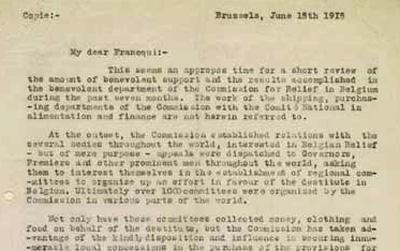
Description
This is a letter from Herbert Hoover to Émile Francqui, who was a Belgian soldier, diplomat, business man and philanthropist. Hoover is reviewing the success of the relief efforts of the Commission For Relief in Belgium, which he was in charge of, during its occupation by…
Colonel Haskell Reports to Herbert Hoover about Russian Relief, August 27, 1923
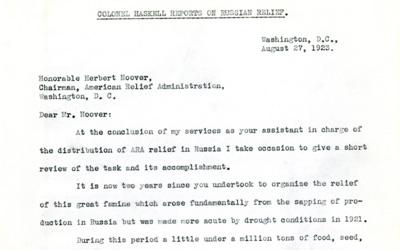
Description
This review letter, dated Aug. 27, 1923, was from Colonel William N. Haskell to Herbert Hoover. Hoover, who oversaw the American Relief Administration, was contacted by Haskell about the completion of the Russian relief effort after World War I.
“Hoover the Humanitarian!,” 1928
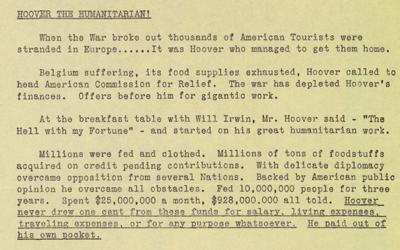
Description
The campaign literature contains information on Herbert Hoover's humanitarian efforts during World War I that was used during his presidential campaign in 1928. This pro-Hoover pamphlet focuses on his achievements in the mining industry and during World War I as food…
Correspondence between Harry S. Truman and Herbert Hoover about Postwar Efforts to Prevent Famine, May 24, 1945
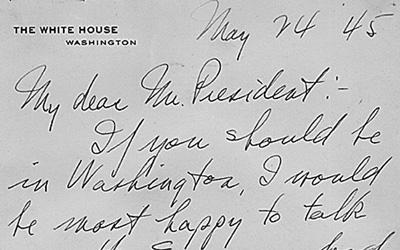
Description
This first letter is an invitation from President Harry S. Truman to former President Herbert Hoover to have a meeting to discuss his potential assistance to prevent post-World War II famine in Europe. Hoover responds to Truman and said he would agree to meet.
Memo of Herbert Hoover's Talks with Argentina President Juan Peron, June 11, 1946
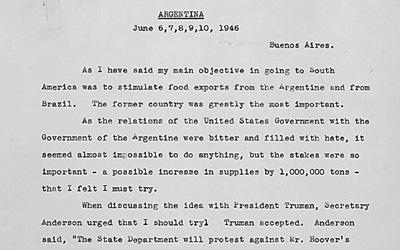
Description
The first 11 pages of this document is a report from Herbert Hoover on his attentions to seek a massive supply of wheat from Argentina's President Juan Peron. The last part of the document is a written record of his urging President Harry S. Truman to stop trade…
"Herbert Hoover and West Branch" Book, 1974
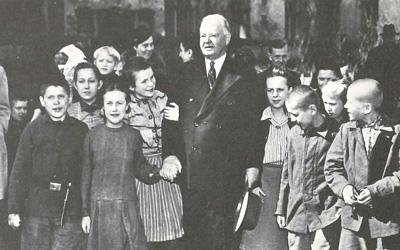
Description
This book covers the history of Herbert Hoover, from his birth in West Branch, Iowa until his death in 1964. The excerpted sections featured above focus on Hoover's influence on the U.S. economy and his vision for the nation.
Inaugural Address of Herbert Hoover, March 4, 1929
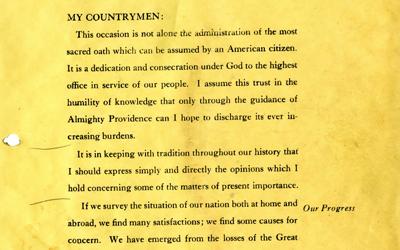
Description
Newly-elected Herbert Hoover outlines his plans for his presidency in his inaugural address in 1929. His speech included speaking about the enforcement of the 18th amendment, which would be the prohibition of alcoholic beverages by declaring the production,…
Herbert Hoover's Response to a Question from the Press, October 24, 1930
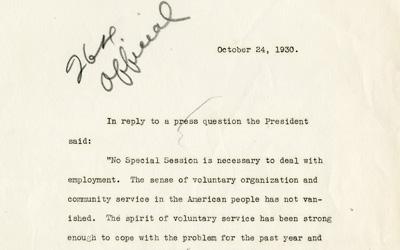
Description
This is a typed response from President Herbert Hoover's administration to the press on the question of whether there should be a special session of Congress on the topic of unemployment. In the document, Hoover's response is, "No Special Session is necessary to deal…
Letter from Herbert Hoover to Herbert S. Crocker, May 21, 1932
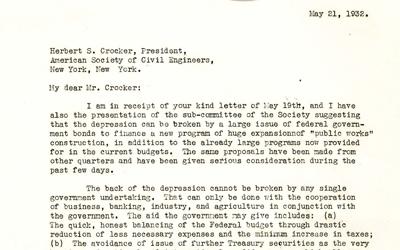
Description
This is a letter from Herbert Hoover to Herbert S. Crocker, President of the American Society of Civil Engineers, responding to the Society's suggestion to expand public works programs. Hoover outlines, in detail, his opposition to expanding public works…
Statement from Herbert Hoover about Emergency Relief and Construction Legislation, July 6, 1932
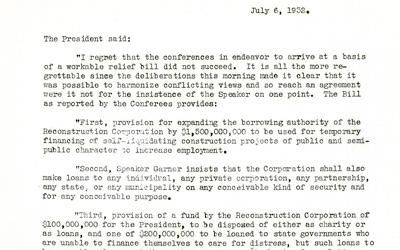
Description
This document is President Herbert Hoover's statement of objections to the Garner-Wagner Bill, which was written to provide more federal assistance to private individuals and businesses with federal loans during the Great Depression, as well as expanding the public works…
Herbert Hoover's Statement to the Press on Federal Activities for Employment, October 17, 1930
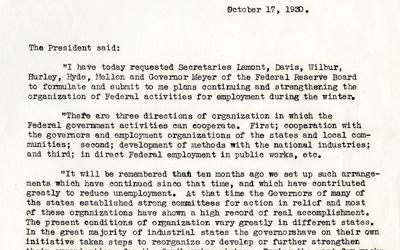
Description
This document is President Herbert Hoover's statement informing the public that his administration's cabinet would be working to strengthen federal actions supporting winter employment.
Additional Resources
- "Uncommon Man" Speech by Herbert Hoover
"Uncommon Man" was one of the best known speeches delivered by Herbert Hoover. It was given during a fundraising event for Wilmingon College in 1948, and it celebrated the importance of human achievement and excellence. - "Come On, Let's 'Hooverize'" Song
This Library of Congress resource is sheet music for a 1918 song called, "Come On, Let's 'Hooverize.'" It focuses on the concessions Hoover emphasized during World War I, and encourages Americans to do their part, such as cutting down on ham and pork, to help the war effort and relief being provided overseas. - Lou Henry Hoover's Comments on Her Husband's Career and Legacy
This is a letter written by Lou Henry Hoover, wife of Herbert Hoover, to her sons and grandchildren during the 1932 presidential campaign. In it, Lou Henry Hoover defends her husband's actions while president, and tries to combat allegations that he is "aloof and uncaring." - "The Real Herbert Hoover," CBS Sunday Morning
This video from CBS Sunday Morning focuses on early career of Herbert Hoover as an engineer and business magnate, who made several fortunes in his 20s. He also is remembered as a great humanitarian for feeding several million starving Belgians during World War I, and for introducing a variety of innovations in American life, from standardized traffic lights to milk cartons. Journalist Mo Rocca examines Hoover's remarkable rise (from humble beginnings to the White House) and his remarkable fall.
Iowa Core Social Studies Standards (6th-12th Grade)
Listed below are the Iowa Core Social Studies content anchor standards that are best reflected in this source set. The content standards applied to this set are middle and high school-age level and encompass the key disciplines that make up social studies for sixth through 12th-grade students.
| No. | Standard Description |
| SS-Gov.9-12.22. | Identify and evaluate the contributions of Iowans who have played a role in promoting civic and democratic principles. |
| SS-US.9-12.16. | Examine labor and governmental efforts to reform and/or maintain a capitalistic economic system in the Great Depression. |
| SS-US.9-12.27. | Evaluate Iowans or groups of Iowans who have influenced U.S. History. |